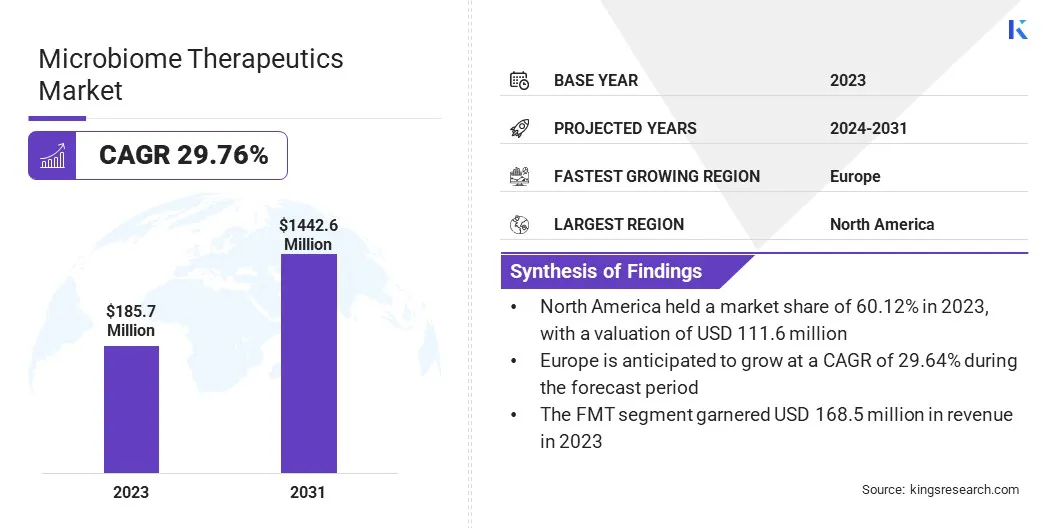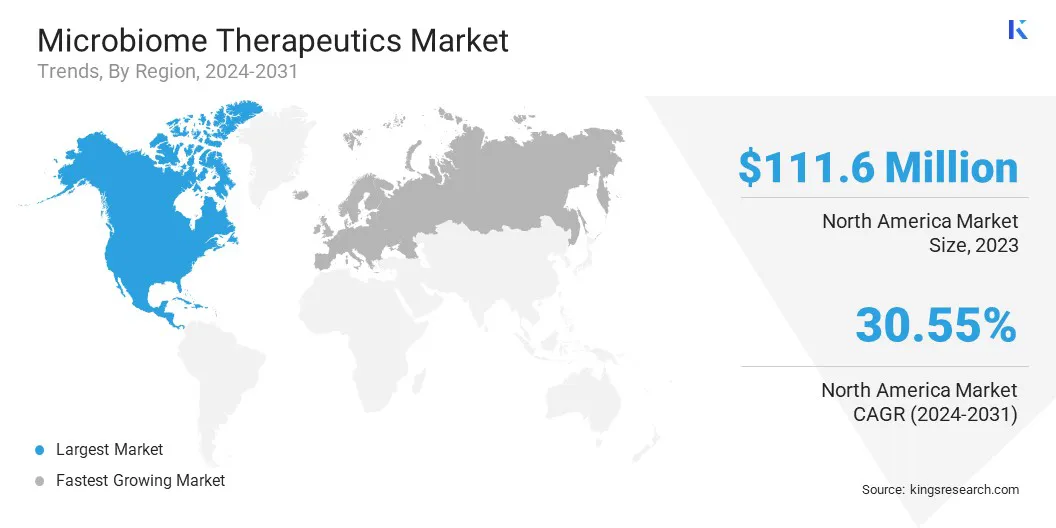Microbiome Therapeutics Market Size
The global Microbiome Therapeutics Market size was valued at USD 185.7 million in 2023 and is projected to grow from USD 232.9 million in 2024 to USD 1,442.6 million by 2031, exhibiting a CAGR of 29.76% during the forecast period. The growth of the market is driven by advances in microbiome research, which facilitated the development of targeted therapies for various infections and diseases.
Key factors fueling market progress include precision medicine approaches to combat antibiotic resistance and enhance treatment outcomes. Growing interest in Fecal Microbiota Transplantation (FMT) and innovations in microbial-based treatments propel market expansion and attract increased investment. In the scope of work, the report includes solutions offered by companies such as Seres Therapeutics, 4D Pharma plc., Locus Biosciences, Inc., Enterome SA, Finch Therapeutics Group, Inc., Intralytix, Inc., Microbiotica, REBYOTA, Rebiotix Inc., Vedanta Bioscience, Inc., Genetic Analysis AS, and others.
The microbiome therapeutics market is experiencing rapid growth, mainly fueled by advancements in microbiome research and the development of targeted therapies. These innovations are revolutionizing treatment approaches for infections and diseases by leveraging the human microbiome's role in health and disease. Key developments include precision treatments to combat antibiotic resistance and enhance patient outcomes.
Fecal microbiota transplantation (FMT) and other microbiome-based therapies are gaining significant traction due to their efficacy in treating gastrointestinal disorders and infections. With increasing investment from the pharmaceutical and biotechnology sectors, the market is poised to experience robust expansion, offering novel therapies that leverage the potential of microbial ecosystems to improve human health.
Microbiome therapeutics involve medical treatments that utilize the human microbiome to prevent, diagnose, or treat diseases. These therapies modify microbial communities to enhance health outcomes, specifically targeting conditions influenced by microbiota composition and function. Key examples include fecal microbiota transplantation (FMT), which restores microbial balance in conditions such as Clostridioides difficile infection, and the development of microbial-based drugs.
Advancements in microbiome research foster innovation in precision medicine approaches, aiming to combat antibiotic resistance and improve treatment efficacy across a spectrum of diseases. The field continues to expand with significant investment and research, presenting potential new therapeutic opportunities for addressing various healthcare challenges.

Analyst’s Review
Microbiome therapeutics is rapidly gaining prominence in healthcare, propelled by innovative treatments and substantial market opportunities.
- For instance, Ferring Pharmaceuticals achieved a milestone with FDA approval of Rebyota in November 2022, a fecal microbiota therapeutic (FMT) for recurrent Clostridioides difficile infections (CDI).
This therapy involves processed stool from healthy donors, rectally administered to restore gut microbiome health. Moreover, Seres Therapeutics introduced Vowst, the first FDA-approved oral microbiome therapy, enriched with beneficial Firmicutes bacteria. Vowst, with Breakthrough Therapy and Orphan Drug designations, demonstrated significant efficacy in preventing CDI recurrence.
Phase 3 trials showcased that 88% of patients remained symptom-free for eight weeks, compared to 60% on placebo. These advancements highlight microbiome therapeutics' notable shift toward precision medicine, leveraging targeted microbial interventions to improve treatment outcomes and address critical medical needs, thereby stimulating market growth.
Microbiome Therapeutics Market Growth Factors
The growing recognition of the microbiome's critical role in health and disease prevention is a key factor boosting the growth of the microbiome therapeutics market. Cutting-edge research has revealed strong correlations between gut microbiota and conditions such as obesity, diabetes, and mental health disorders, prompting substantial investments in microbiome-based therapies.
This increased focus is fostering innovation and expanding therapeutic applications, positioning microbiome science at the forefront of medical advancements. As understanding deepens, the sector is likely to witness significant growth, offering lucrative opportunities for stakeholders in pharmaceuticals and biotechnology.
The market is facing challenges due to the complexity and variability of the human microbiome itself, influenced by genetics, diet, environment, and lifestyle. This variability complicates the development of standardized therapeutic approaches that consistently achieve desired clinical outcomes across diverse patient populations.
Key players are investing heavily in research and development to better understand microbiota diversity, employing advanced genomic and bioinformatic tools to identify microbial signatures and conducting rigorous clinical trials to validate safety and efficacy. Their efforts to overcome variability challenges and establish effective microbiome-based therapies are expected to bolster market growth in the coming years.
Microbiome Therapeutics Market Trends
Advancements in microbiome research are contributing significantly to the development of more effective treatments for infections and various diseases, thereby enhancing medical care outcomes. This growing knowledge enables the development of targeted therapies that modulate the microbiome to combat pathogens effectively.
- For instance, on April 30, 2024, Vedanta Biosciences announced a USD 3.9 million CARB-X grant to advance its VE707 preclinical development program, aimed at reducing colonization and preventing infections by multidrug-resistant organisms. This funding, following the achievement of key milestones supported by previous CARB-X awards totaling USD 5.7 million, highlights the sector’s progress.
Such advancements facilitate precision treatments, reduce antibiotic resistance, and improve patient outcomes, setting new standards in healthcare and boosting the growth of the microbiome therapeutics market.
Moreover, advancements in microbiome-based treatments, such as Fecal Microbiota Transplantation (FMT), are facilitating market growth. FMT, or bacteriotherapy, involves transferring fecal matter from a healthy donor into a patient’s intestinal tract, aiming to restore bacterial diversity and enhance bacterial-derived metabolites.
Despite being the crudest form of live microbiome therapy due to its undefined microbial mixture, FMT has demonstrated efficacy in treating conditions such as Clostridioides difficile infection and other gastrointestinal disorders. This has spurred further research and development of more refined microbiome-based therapies.
- For instance, in June 2024, Genetic Analysis AS announced the grant of a critical patent (EP3526340) by the European Patent Office for a diagnostic method to determine the likelihood of patients with Irritable Bowel Syndrome (IBS) responding to a low-FODMAP diet or FMT.
Such innovations attract substantial investment and interest from pharmaceutical and biotechnology companies, fueling expansion and innovation within the microbiome therapeutics market.
Segmentation Analysis
The global market is segmented based on type, application, and geography.
By Type
Based on type, the microbiome therapeutics market is categorized into drugs and FMT. The FMT segment garnered the highest revenue of USD 168.5 million in 2023. This growth is attributed to its promising efficacy in treating conditions such as Clostridioides difficile infection and other gastrointestinal disorders. FMT involves transferring fecal matter from a healthy donor to a patient, restoring microbial balance and enhancing bacterial diversity in the gut.
This therapy has shown significant efficacy where traditional treatments have failed, prompting increased adoption and research. As regulatory frameworks evolve and clinical evidence accumulates, the acceptance of FMT is growing, expanding its application beyond initial indications. This substantial growth underscores FMT's pivotal role in advancing microbiome-based therapies and shaping the landscape of healthcare solutions.
By Application
Based on application, the market is divided into c.difficile, inflammatory bowel disease, diabetes, immuno-oncology, and others. The inflammatory bowel disease segment captured the largest microbiome therapeutics market share of 34.56% in 2023. The segmental growth is mainly propelled by the introduction of innovative approaches that target the underlying microbial imbalances associated with the condition.
Microbiome-based therapies, such as fecal microbiota transplantation (FMT) and microbial-based drugs, exhibit potential in modulating gut microbiota to alleviate symptoms and potentially induce remission in patients suffering from IBD. These therapies represent a paradigm shift from traditional treatments, providing personalized and potentially more effective options.
As clinical trials demonstrate efficacy and regulatory frameworks evolve to support these therapies, the segment is witnessing significant growth. This is leading to increased investment, intensified research efforts, and widespread adoption of microbiome therapeutics for IBD, which is slated to fuel the growth of the segment in the coming years.
Microbiome Therapeutics Market Regional Analysis
Based on region, the global market is classified into North America, Europe, Asia-Pacific, MEA, and Latin America.

North America microbiome therapeutics market share stood around 60.12% in 2023 in the global market, with a valuation of USD 111.6 million. The region's leading position is strengthened by a deepening understanding of the human microbiome's significance in health and disease prevention. Researchers across the US are actively exploring microbiome-based interventions as promising treatments, particularly for chronic diseases such as obesity and inflammatory bowel disease, which are prevalent in the region.
Technological advancements in gene sequencing and bioinformatics enhance the precision of microbiome studies, thereby facilitating the development of personalized therapies. Collaborations across academia, industry, and government are enhancing research translation into viable commercial products, thus fostering domestic market growth.
Regulatory support and substantial investment further bolster regional market expansion, with regulatory bodies providing crucial guidance and frameworks to advance microbiome therapeutics from discovery to clinical application.
Europe is anticipated to witness a significant growth at a robust CAGR of 29.64% over the forecast period. The region's growing focus on precision medicine and personalized healthcare aligns well with the development of microbiome-based therapies. Increasing prevalence of chronic diseases and growing awareness regarding microbiome's role in health are leading to increased demand for innovative treatments.
Technological advancements in genomic research and bioinformatics are enabling more targeted approaches to microbiome studies and therapy development, which is expected to augment Europe microbiome therapeutics market development.
Competitive Landscape
The microbiome therapeutics market report will provide valuable insight with an emphasis on the fragmented nature of the industry. Prominent players are focusing on several key business strategies such as partnerships, mergers and acquisitions, product innovations, and joint ventures to expand their product portfolio and increase their market shares across different regions.
Companies are implementing impactful strategic initiatives, such as expanding services, investing in research and development (R&D), establishing new service delivery centers, and optimizing their service delivery processes, which are likely to create new opportunities for market growth.
List of Key Companies in Microbiome Therapeutics Market
- Seres Therapeutics
- 4D Pharma plc.
- Locus Biosciences, Inc.
- Enterome SA
- Finch Therapeutics Group, Inc.
- Intralytix, Inc.
- Microbiotica
- REBYOTA
- Rebiotix Inc.
- Vedanta Bioscience, Inc.
- Genetic Analysis AS
Key Industry Development
- April 2023 (Regulatory Approval): Seres Therapeutics, Inc. and Nestlé Health Science announced that the U.S. Food and Drug Administration (FDA) approved VOWSTTM (formerly known as SER-109). VOWST is an orally administered microbiota-based therapeutic specifically designed to prevent the recurrence of Clostridioides difficile Infection (CDI) in adults who have undergone antibacterial treatment for recurrent CDI (rCDI). Notably, VOWST is not indicated for treating CDI itself, marking a significant advancement in managing recurrent CD through innovative microbiota-focused interventions.
The global microbiome therapeutics market is segmented as:
By Type
By Application
- C. difficile
- Inflammatory Bowel Disease
- Diabetes
- Immuno-oncology
- Others
By Region
- North America
- Europe
- France
- U.K.
- Spain
- Germany
- Italy
- Russia
- Rest of Europe
- Asia-Pacific
- China
- Japan
- India
- South Korea
- Rest of Asia-Pacific
- Middle East & Africa
- GCC
- North Africa
- South Africa
- Rest of Middle East & Africa
- Latin America
- Brazil
- Argentina
- Rest of Latin America


